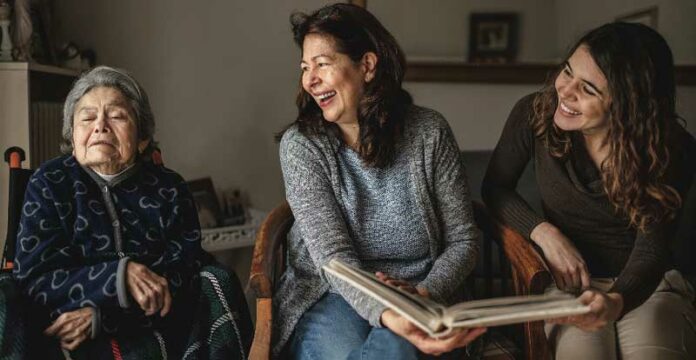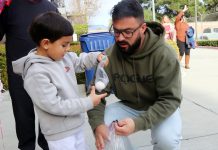
SANTA CRUZ COUNTY—In honor of International Women’s Month, Hospice of Santa Cruz County (HSCC) and the Hospice Giving Foundation (HGF) will host a free virtual roundtable on March 24.
“The Role of Latina Women in the Care of Parents and Grandparents” will be held from noon-1:30pm on Zoom. The Spanish-language event will feature a panel of professionals and community members sharing their perspectives on the experience of Latina caregivers in the community. It will also offer resources to support caregivers.
“Latino culture has a very strong pressure on the female members of the family to be superwomen,” said Pilar Mateos, community liaison at HSCC. “They have to be Mom, cook, babysitter, housecleaner … All of us have elderly parents, and automatically the female members of the family end up being the caregivers by default. And they have little support.”
Mateos added that many of these women grow up feeling like they can not ask for support.
“They think, ‘I have to do everything, I have to do it alone, I have to do it well … I will not show myself vulnerable, asking for help is not a good thing,’” she said. “We’d like to let them know they are not alone and please, ask for help. We hear you and want to support you.”
HGF held a similar workshop last year to share stories and resources. This year, they decided to join efforts with HSCC to hold the event in a new format—bringing in professional Latinas to be part of the panel.
“The professionals are going to answer questions, and we’re going to guide the conversation,” explained Erandi Garcia, program specialist at HGF. “We want to understand the role of Latino women caring for parents and grandparents, from the social and psychological perspective. What can we do to get other family members involved? Mainly, the male members? Because this is not a woman’s responsibility—it’s the whole family’s.”
Irma Vega, grief support volunteer at HSCC, will kick off the discussion. Panelists also include HSCC board member Sigolène Ortega, psychologist with the Monterey County Department of Mental Health Dr. Yarira Medina-Cuvila, and medical social worker Dianna De La Paz. Panelists and attendees are welcome to share their reflections, experiences, and knowledge related to the role of Latina women in caring for family members as they experience health challenges and aging.
“Latino families are very family-oriented, and we don’t want others to take care of our parents and grandparents,” Garcia said. “We want to do it. But many families don’t have the resources, they don’t know about all the programs that could help them.”
Vanessa Silverstein, education and outreach program manager at HSCC, agreed.
“There are so many family members caring for loved ones at home,” she said, “who only need to reach out for help. This event is a great opportunity … to bring people together, so that caregivers know that they’re not alone.”
The panel also aims to educate the greater Latino community about hospice care and other services, including HSCC’s transitional and palliative care programs.
“There’s very little knowledge and understanding about what we do,” Mateos said. “It’s a whole cycle, a whole team who can support the families. We are here for the community, we want our message out there to let people know.”
Nancy Gere, senior director of marketing and communication at HSCC, pointed out that there is no direct translation for “hospice services” in Spanish.
“The word, ‘el hospicio’ translates to asylum, poorhouse, or infirmary,” Gere said, “which in no way represents what hospice care provides … You can see why a native Spanish speaker would be hesitant to refer their loved one to hospice care. One of the goals of the panel is to explain what hospice care is and what it is not, so women can be well-informed and make the right choices for themselves and their families.”
Mateos added that they recognize there is a lot of fear in the Latino community about asking for help, because they are worried about their immigration status or receiving an expensive bill. But HSCC and HGF are not agencies or companies, she said.
“We aren’t going to ask anyone about their status in the country, or ask them to pay us,” she said. “We are both nonprofits. We are here to listen and we want to help.”
For information and to register for the panel visit es.hospicesantacruz.org or call 345-6315.











